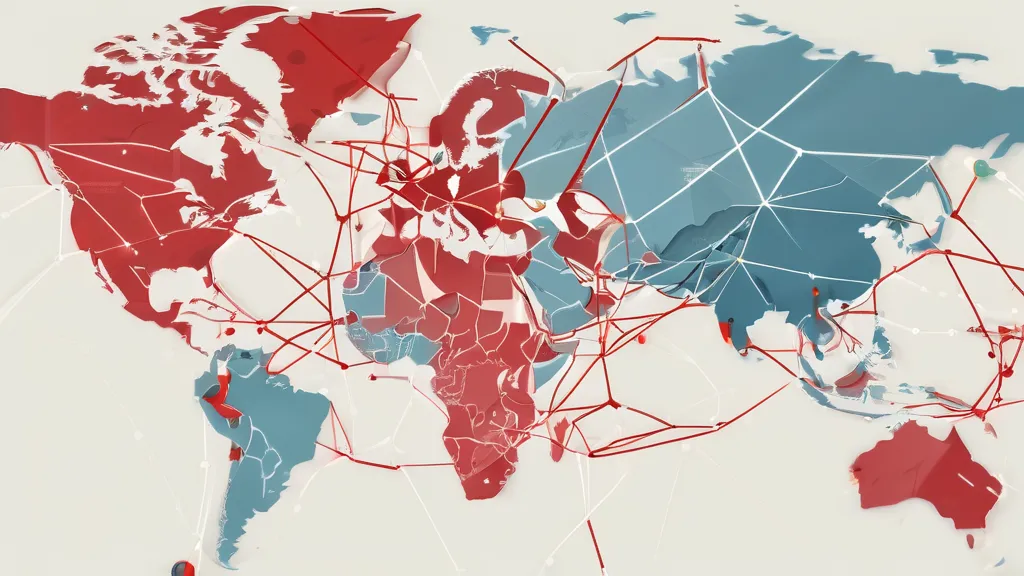The Battle for Digital Influence: Google's Crackdown on State-Linked Propaganda
Google's recent crackdown on state-linked propaganda campaigns highlights the complexities of digital content moderation.

- Google removed nearly 11,000 YouTube channels tied to state-linked propaganda.
- The takedown included over 7,700 channels linked to China and 2,000 to Russia.
- State-linked campaigns utilize sophisticated methods to influence public opinion.
- The role of tech giants in moderating content raises questions about free speech.
- Misinformation campaigns have significant real-world impacts.
The Digital Battlefield: An Introduction
In the ever-evolving landscape of digital media, the battle for influence is as fierce as ever. On Monday, Google announced a significant move in this ongoing struggle: the removal of nearly 11,000 YouTube channels and other accounts linked to state-backed propaganda campaigns from countries like China and Russia. This action highlights the complexities and challenges of moderating content in a digital age where information warfare is a tool of geopolitical strategy.
Unpacking the Numbers: A Closer Look at Google’s Takedown
Google’s removal of 11,000 YouTube channels is not just a statistic; it represents a significant effort to combat misinformation and propaganda. Over 7,700 of these channels were linked to China, disseminating content in both Chinese and English. These channels primarily promoted the People’s Republic of China, supported President Xi Jinping, and commented on U.S. foreign affairs. Such campaigns are indicative of the broader strategy employed by the Chinese state to shape international narratives in its favor.
Russia was another major player in this digital propaganda landscape, with over 2,000 channels removed. The content from these channels was multilingual and aimed at supporting Russia’s geopolitical stance while criticizing Ukraine, NATO, and Western policies. This tactic is reminiscent of the Russian playbook employed in various instances over the past decade, where digital platforms are used to sow discord and influence public opinion.
The Mechanics of Propaganda: How It Works
State-linked propaganda campaigns utilize a variety of methods to spread their messages. These can include creating fake accounts, employing bots to amplify messages, and strategically placing content to reach specific audiences. The content often blends factual information with misleading or biased narratives, making it difficult for the average user to discern truth from fiction.
Experts like Dr. Samantha Bradshaw from the University of Oxford’s Internet Institute note that “the sophistication of these campaigns has increased exponentially, with state actors leveraging advanced technologies to target specific populations with tailored messages.” This creates a potent mix of credible and misleading information that can have real-world impacts on public opinion and political landscapes.
The Role of Tech Giants: A Balancing Act
Google’s actions are part of a broader effort by tech giants to address the spread of misinformation and propaganda on their platforms. However, this raises critical questions about the role of private companies in moderating speech and information. On one hand, there is a clear need to curb the spread of harmful content that can destabilize societies and influence democratic processes. On the other hand, there is a risk of overreach, where legitimate voices and dissenting opinions might be stifled under the guise of content moderation.
Twitter, Facebook, and other platforms have faced similar challenges, often finding themselves at the center of debates about free speech and censorship. The responsibility of these platforms to act as arbiters of truth is a contentious issue, with critics arguing that corporate interests may sometimes conflict with the public good.
The Impact of Propaganda: Real-World Consequences
The impact of state-linked propaganda is not just confined to digital spaces; it has real-world consequences. In recent years, misinformation campaigns have been linked to election interference, social unrest, and even violence. For example, the 2016 U.S. presidential election saw significant interference from Russian actors, as detailed in multiple investigations and reports.
In the current geopolitical climate, these efforts have only intensified. The ongoing conflict in Ukraine has been a focal point for Russian propaganda, aimed at justifying military actions and undermining support for Ukraine globally. Similarly, China’s efforts to promote its policies and leadership on the world stage are part of a broader strategy to assert its influence and counter Western narratives.
Diverse Perspectives: Balancing the Narrative
While tech companies are taking steps to address these issues, it is essential to consider diverse perspectives. Some argue that the focus on state-linked propaganda should not overshadow the need to address other forms of misinformation, such as those perpetuated by non-state actors or domestic groups. Additionally, there is a need for international cooperation and regulation to tackle this global challenge effectively.
Professor Mark Galeotti, an expert in Russian studies, suggests that “a multi-faceted approach is necessary, involving government, industry, and civil society to create a resilient information ecosystem.” This includes investing in media literacy programs, supporting independent journalism, and developing robust frameworks for cross-border cooperation.
Conclusion: Navigating the Future of Digital Discourse
Google’s recent actions against state-linked propaganda underscore the ongoing battle for digital influence in a connected world. As technology continues to evolve, so too will the tactics employed by those seeking to manipulate public opinion. The challenge for tech companies, governments, and society at large is to navigate this complex landscape while upholding the values of free expression and open discourse.
As we look to the future, the question remains: How can we create a digital environment that is both open and secure, where diverse voices can thrive without falling prey to manipulation? The answer will require a concerted effort from all stakeholders, with a focus on transparency, accountability, and collaboration.
As readers and participants in this digital age, we must remain vigilant, questioning the sources of our information and advocating for a balanced and informed discourse. In doing so, we can help shape a future where digital spaces are places of genuine engagement and democratic exchange.
References
Call to Action
What steps do you think should be taken to combat state-linked propaganda on digital platforms? Share your thoughts and join the conversation.